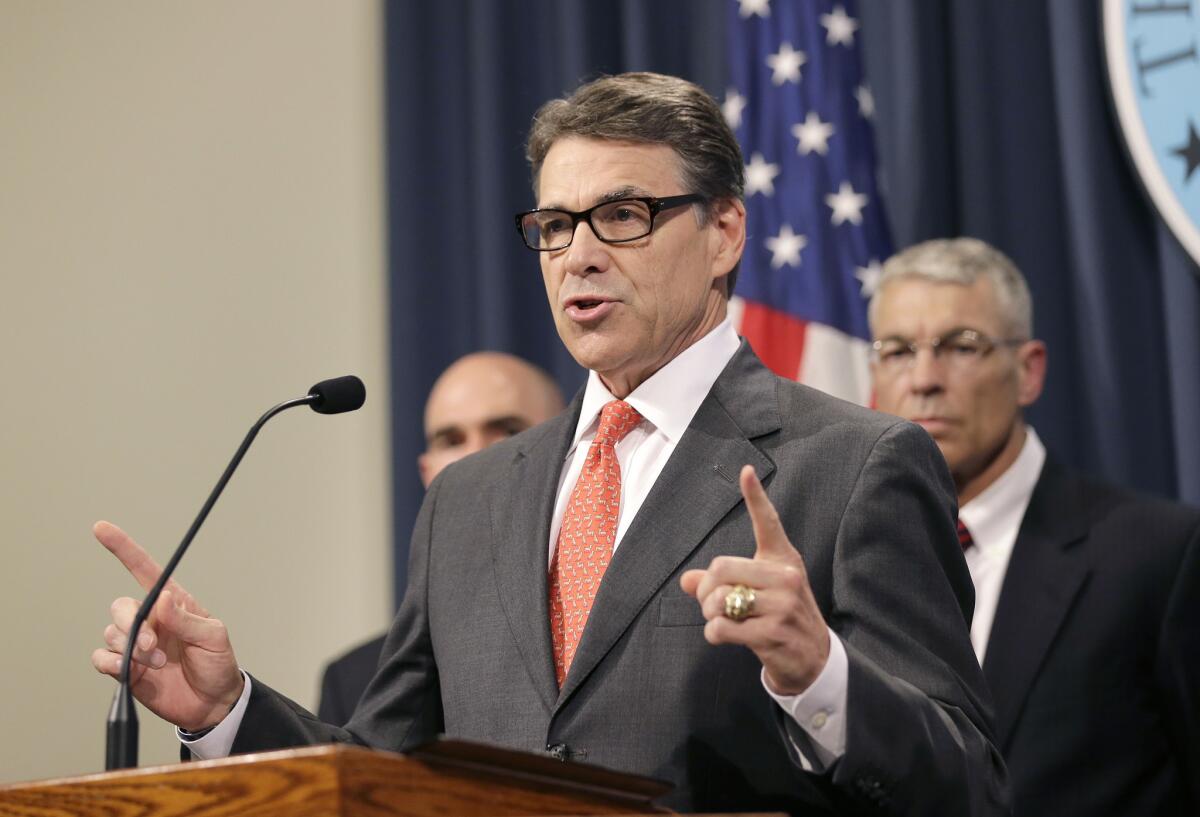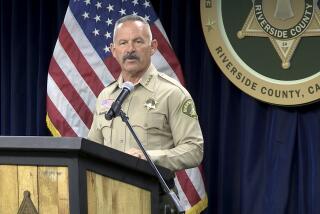Texas Guard troops don’t get arrest powers at border -- yet

- Share via
Reporting from Dallas — When Texas Gov. Rick Perry called on President Obama last month to deploy federal troops to help quell the surge of immigrants crossing the border illegally, he urged the president to give the troops “arrest powers to support Border Patrol operations.”
Last week, Perry announced that he was activating 1,000 National Guard troops in response to the border crisis in the Rio Grande Valley.
Because the troops were deployed by Perry and not federal officials, experts said Perry can allow them to make arrests and apprehensions. But will he?
The governor’s office says no, at this point, but some local officials in the border region and immigrant advocates expressed concern about the possibility.
Tim Dunn, a sociology professor at Salisbury University who spent years teaching in Texas and has written several books about militarization of the border, noted that in 1997 in West Texas, a Marine assigned to work with Border Patrol shot and killed a Latino high school student herding his family’s goats.
“The military, including the National Guard, have been reluctant to take a direct enforcement role” on the border, Dunn said, especially making arrests, “because they’re not trained to handle that kind of situation.”
Guard officials have been tight-lipped about when and where they’re training and deploying, and even they acknowledge that has led to speculation about their mission.
“There’s a lot of confusion out there about what our role is,” said Lt. Col. Joanne MacGregor, a spokeswoman for the National Guard based in Texas.
MacGregor said she wanted to dispel any misperception that troops will arrive at the border en masse, “locked and loaded like in Iraq.”
“People have this idea of convoys driving down in mass formations, and that’s not how it will likely work,” she said.
She said troops have not been asked to detain suspects so far, but will be prepared to alert other agencies if they witness illegal acitivity.
“Our role is to look for the criminal element,” MacGregor said, adding that, “We are going to have a very thoughtful, thorough training plan so that everyone knows these are your boundaries.”
The guard has routinely been deployed to the border, with 240 Texas National Guard troops already there at the time of Perry’s announcement July 21.
At Perry’s briefing last week, Maj. Gen. John F. Nichols, the adjutant general of the Texas National Guard, said the newly deployed troops would play a supportive role, deterring Mexican drug cartels, transnational smugglers and other criminal organizations while referring those suspected of immigrating illegally to the Border Patrol.
But arrest powers would be something new.
Border sheriffs complained they were not consulted before Perry’s announcement, and expressed concern that Perry would send in troops unfamiliar with the area instead of granting the money spent on the guard — $12 million a month — to their agencies for added staff and overtime.
Perry has asked federal authorities to foot the bill, but it’s unclear if they will.
In 2006, President George W. Bush sent 6,000 troops to Texas and three other border states at the behest of state officials. Four years later, President Obama deployed 1,200 troops. Neither deployment involved granting the troops arrest powers.
The latest deployment is different. Instead of aiding Border Patrol, troops will support the Texas Department of Public Safety.
They will be able to enforce state laws but not federal immigration law. A 19th century federal law makes it a crime for military personnel to perform civilian law enforcement — but the law does not apply to such state-deployed troops.
Nichols, the major general, has suggested the troops could detain people if empowered to do so by the governor.
“While the governor does have the ability to give the National Guard arrest authority, that is not part of the mission at this time,” a Perry spokeswoman said in a statement.
If troops encounter someone committing a state crime, they will refer the individual to public safety officers to handle any arrests, she said.
If the individual is suspected of committing a federal offense, they would also refer the individual to public safety, who then refers them to the appropriate federal agency, she said, noting public safety “has a strong framework for law-enforcement operations along the border and Gov. Perry has great confidence in their ability to keep Texans safe.”
Twitter: @mollyhf
More to Read
Sign up for Essential California
The most important California stories and recommendations in your inbox every morning.
You may occasionally receive promotional content from the Los Angeles Times.














